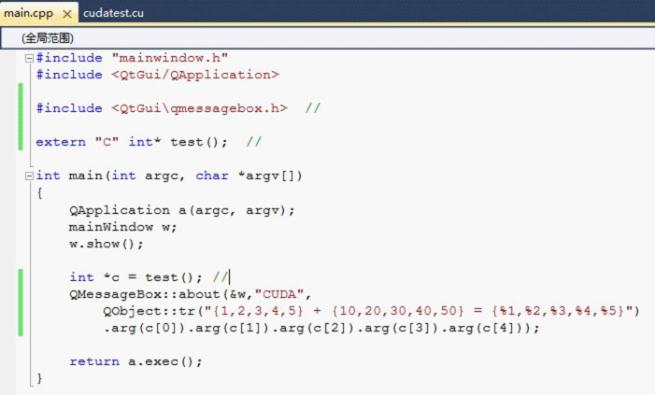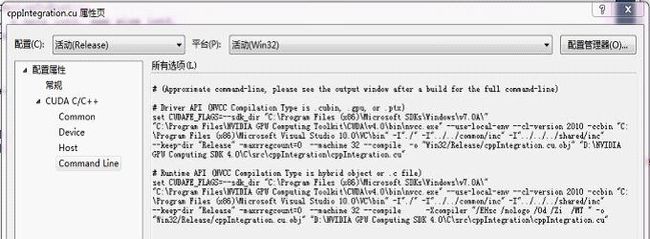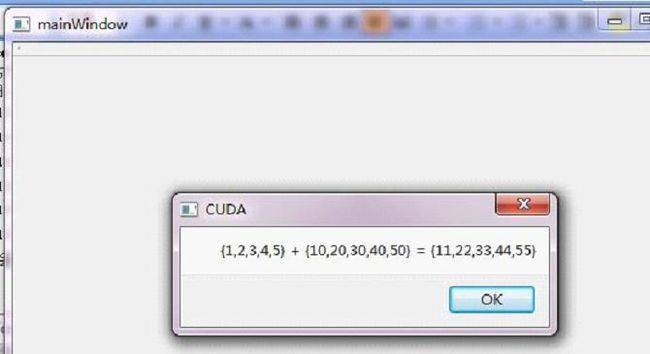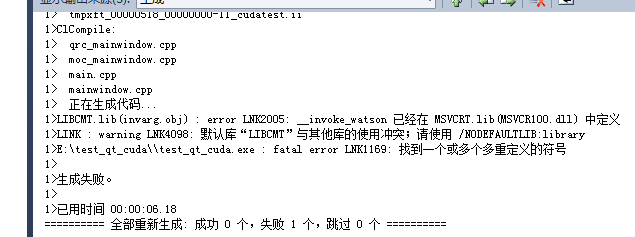如何在VS2010 + QT中调用CUDA
如何在VS2010 + QT中调用CUDA
环境: Windows 7 SP1 x64
Microsoft Visual Studio 2010
qt-win-opensource-4.7.4-vs2008.exe + qt-vs-addin-1.1.9.exe
CUDA 4.0
VS2010 + qt 和CUDA 4.0的安装及配置请参考网上资料
步骤:
1. 创建一个QMainWindow的Qt程序
个人喜欢类名为mainwindow,然后点击Finish
2.然后注意将Debug改成Release(本人只配置了Release Win32版的)
3.创建 CUDA 的.cu文件
(1)Source Files ->添加->新建项
(2) cudatest.cu文件:
(3)
////////////////////////////////////////////////////////////////////////////////////////
(4) cudatest.cu代码:
#include "cuda_runtime.h"
#include "device_launch_parameters.h"
__global__ void addKernel(int *c, const int *a, const int *b)
{
int i = threadIdx.x;
c[i] = a[i] + b[i];
}
// Helper function for using CUDA to add vectors in parallel.
void addWithCuda(int *c, const int *a, const int *b, size_t size)
{
int *dev_a = 0;
int *dev_b = 0;
int *dev_c = 0;
// Choose which GPU to run on, change this on a multi-GPU system.
cudaSetDevice(0); //设置目标GPU
// Allocate GPU buffers for three vectors (two input, one output)//
//在显存上开辟内存空间
cudaMalloc((void**)&dev_c, size * sizeof(int));
cudaMalloc((void**)&dev_a, size * sizeof(int));
cudaMalloc((void**)&dev_b, size * sizeof(int));
// Copy input vectors from host memory to GPU buffers.
//将内存的数据复制到显存
cudaMemcpy(dev_a, a, size * sizeof(int), cudaMemcpyHostToDevice);
cudaMemcpy(dev_b, b, size * sizeof(int), cudaMemcpyHostToDevice);
//调用GPU上的函数
// Launch a kernel on the GPU with one thread for each element.
addKernel<<<1, size>>>(dev_c, dev_a, dev_b);
// cudaDeviceSynchronize waits for the kernel to finish, and returns
// any errors encountered during the launch.
cudaDeviceSynchronize(); //GPU的线程同步
//将结果复制到内存上
// Copy output vector from GPU buffer to host memory.
cudaMemcpy(c, dev_c, size * sizeof(int), cudaMemcpyDeviceToHost);
//释放显存空间
cudaFree(dev_c);
cudaFree(dev_a);
cudaFree(dev_b);
// cudaDeviceReset must be called before exiting in order for profiling and
// tracing tools such as Parallel Nsight and Visual Profiler to show complete traces.
cudaDeviceReset(); //
}
extern "C" int* test()
{
const int arraySize = 5;
const int a[arraySize] = { 1, 2, 3, 4, 5 };
const int b[arraySize] = { 10, 20, 30, 40, 50 };
int *c = new int[5];
// Add vectors in parallel.
addWithCuda(c, a, b, arraySize);
return c;
}
/////////////////////////////////////////////////////////ENDCU
(4) 然后到main.cpp:
关于cu文件里的test函数,我们用extern的方式在main.cpp文件里调用(这里是参考 \NVIDIA GPU Computing SDK 4.0\C\src\cppIntegration这个example的...所以不用将cudatest.cu文件include到main.cpp里///
因为c++中调用C的lib,需要用extern "C"来修饰用到的c的头文件。
(5)
代码为:
#include "mainwindow.h"
#include <QtGui/QApplication>
#include <QtGui\qmessagebox.h> //
extern "C" int* test(); //
int main(int argc, char *argv[])
{
QApplication a(argc, argv);
mainWindow w;
w.show();
int *c = test(); //
QMessageBox::about(&w,"CUDA",
QObject::tr("{1,2,3,4,5} + {10,20,30,40,50} = {%1,%2,%3,%4,%5}")
.arg(c[0]).arg(c[1]).arg(c[2]).arg(c[3]).arg(c[4]));
return a.exec();
}
//////////////////////////////////////////////////////////////
(6)在cudatest.cu点击右键->属性:
将不参与生成,改为:自定义生成工具:
点击"应用"后,修改为:
命令行:
"$(CUDA_BIN_PATH)\nvcc.exe"--use-local-env --cl-version 2010 -ccbin "C:\Program Files (x86)\MicrosoftVisual Studio 10.0\VC\bin" --keep-dir "Release" -maxrregcount=0 --machine 32 --compile -Xcompiler "/EHsc /nologo /Od /Zi /MD " -o$(ConfigurationName)\cudatest.cu.obj cudatest.cu
输出:
$(ConfigurationName)\cudatest.cu.obj
//参数中的文件名自己改:
这里的参数,因为在不同的环境可能不同(这里我看了网上的好多例子,在它的例子可能可以,但去到我的机器就有问题,所以我都试了好久)
可以打开\NVIDIA GPU Computing SDK 4.0\C\src\cppIntegration这个example,然后参考cppIntegration.cu的属性页:
可以将以上这一段改改试试
点击test_qt_cuda项目的属性页:
//以下为一些QT CUDA 配置时应该做好的设置:
VC++目录->包含目录: (添加以下)
C:\Program Files\NVIDIA GPUComputing Toolkit\CUDA\v4.0\include;
D:\NVIDIA GPU Computing SDK4.0\C\common\inc;
D:\NVIDIA GPU Computing SDK4.0\shared\inc;
D:\Qt\4.7.4\include;
VC++目录->库目录:
C:\Program Files\NVIDIA GPUComputing Toolkit\CUDA\v4.0\lib\Win32;
D:\NVIDIA GPU Computing SDK4.0\C\common\lib\Win32;
D:\NVIDIA GPU Computing SDK4.0\shared\lib\Win32;
D:\Qt\4.7.4\lib
链接器->常规->附加库目录:
$(QTDIR)\lib;
$(CudaToolkitLibDir);
链接器->输入->附加依赖项:
qtmain.lib;QtCore.lib;QtGui.lib;
cudart.lib;cublas.lib;cutil32.lib;shrUtils32.lib;
上面的目录,大家也可以用环境变量那里设置好的
生成的输出:
1> Performing Custom Build Tools
1> cudatest.cu
1> tmpxft_00000a70_00000000-0_cudatest.cudafe1.gpu
1> tmpxft_00000a70_00000000-5_cudatest.cudafe2.gpu
1> cudatest.cu
1> tmpxft_00000a70_00000000-0_cudatest.cudafe1.cpp
1> tmpxft_00000a70_00000000-11_cudatest.ii
会生成一个cudatest.cu.obj文件:
以上在我的机器是正常运行的:
大家在调试的过程中要善于看生成的输出,看看是*.cu文件有没有成功生成为*.cu.obj文件,如果失败,就很可能是"自定义生成工具"那里的命令行的参数有问题,如果成功的话,我之前遇到1>Link:
的时候出问题,这里我们就要看链接器那里有没有设置错,有里会出现无法找到*.dll之类的,这里就要看VC++目录->库目录: / 链接器->常规->附加库目录:/链接器->输入->附加依赖项:
里有没能少了什么库,不断地摸索,尤其参考一下SDK里的cppIntegration那个example,然后总会成功的...
之前一直想直接找个可以运行的例子,一直找不到,现在我这个工程的下载地址:
http://www.rayfile.com/zh-cn/files/ed735400-f7a2-11e0-81ca-0015c55db73d/
参考文件:
http://wenku.baidu.com/view/203b72d133d4b14e852468b2.html
http://wenku.baidu.com/view/b109f202bed5b9f3f90f1c10.html
---------------------------------------------------------------------------华丽的分割线---------------------------------------------------------------------------------------------------------
或者大家都会遇到一个问题: 怎样可以静态编译出QT+CUDA的软件呢??都不用依赖QT或CUDA的DLL和VC的DLL的呢??
首先配置好静态的QT的环境:
1: 安装 qt-win-opensource-4.7.4-vs2008.exe (我安装到 D:\Qt\4.7.4)
2:进入D:\Qt\4.7.4\mkspecs\win32-msvc2010 打开 qmake.conf
并修改: 将 QMAKE_CFLAGS_RELEASE 和 QMAKE_CFLAGS_DEBUG 中的 -MD -MDd 分别修改为 -MT 和 -MTd
这里设定为静态的C/C++ 运行库
3:用VS2010的命令行 进入 D:\Qt\4.7.4\ 目录,
然后 输入:
configure -platform win32-msvc2010 -debug-and-release -opensource -static -fast -qt-sql-sqlite -plugin-sql-sqlite -no-qt3support -qt-zlib -qt-gif -qt-libpng -qt-libmng -qt-libtiff -qt-libjpeg -no-webkit -nomake examples -nomake docs -nomake demos
-static 表示表态的QT库
4: 1个小时后就得到 不依赖 QtCore4.dll、QtGui4.dll 等 Qt 的静态库 且 不依赖 msvcr90.dll、msvcp90.dll 等 C、C++ 的运行库 的QT 环境
-
详细请参考:http://hi.baidu.com/cyclone/blog/item/25b262d9337a172310df9b78.html
5: 然后安装 CUDA 的环境: devdriver_4.0_270.81 + cudatoolkit_4.0.17 + cudatools_4.0.17 + GPUcomputingsdk_4.0.17 + Parallel_Nsight 2.0
然后其它的参考上面...........................................
默认为 /MDd的,/Md时会出现如下错误:
1>LIBCMT.lib(invarg.obj) : error LNK2005: __invoke_watson 已经在 MSVCRT.lib(MSVCR100.dll) 中定义
1>LINK : warning LNK4098: 默认库“LIBCMT”与其他库的使用冲突;请使用 /NODEFAULTLIB:library
1>E:\test_qt_cuda\\test_qt_cuda.exe : fatal error LNK1169: 找到一个或多个多重定义的符号
所以要设置为MT:
这样设置后,上面的错误还是会存在,然后我们再设置.cu文件的自定义生成工具的命令行 :
上面的是:
命令行:
"$(CUDA_BIN_PATH)\nvcc.exe"--use-local-env --cl-version 2010 -ccbin "C:\Program Files (x86)\MicrosoftVisual Studio 10.0\VC\bin" --keep-dir "Release" -maxrregcount=0 --machine 32 --compile -Xcompiler "/EHsc /nologo /Od /Zi /MD " -o$(ConfigurationName)\cudatest.cu.obj cudatest.cu
将其中的 /MD 改为 /MT:
命令行:
"$(CUDA_BIN_PATH)\nvcc.exe"--use-local-env --cl-version 2010 -ccbin "C:\Program Files (x86)\MicrosoftVisual Studio 10.0\VC\bin" --keep-dir "Release" -maxrregcount=0 --machine 32 --compile -Xcompiler "/EHsc /nologo /Od /Zi /MT " -o$(ConfigurationName)\cudatest.cu.obj cudatest.cu
然后再运行看看:
1>Link:
1> test_qt_cuda.vcxproj -> E:\test_qt_cuda\test_qt_cuda.exe
1>FinalizeBuildStatus:
1> 正在删除文件“Release\test_qt_cuda.unsuccessfulbuild”。
1> 正在对“Release\test_qt_cuda.lastbuildstate”执行 Touch 任务。
1>
1>生成成功。
成功生成.............现在就是可以得到绿色的软件了......
附上这次成功的工程: http://download.csdn.net/detail/irelandken/3709655
梁志峰
广东工业大学[email protected]













